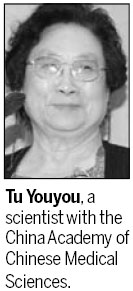Society
Researcher wins 'America's Nobel'
Updated: 2011-09-26 08:04
(China Daily)
NEW YORK - A Chinese scientist received a prestigious US award over the weekend for the discovery of artemisinin, a drug therapy for malaria that has saved millions of lives across the globe, especially in the developing world.
|
|
Pharmacologist Tu Youyou, 81, became the first scientist on the Chinese mainland to win the Lasker Award, known as "America's Nobel" for its knack of gaining future recognition from the Nobel committee.
Tu, a scientist at the China Academy of Chinese Medical Sciences in Beijing, pioneered a new approach to malaria treatment that has benefited hundreds of millions of people and promises to benefit many times more.
By applying modern techniques and rigor to a heritage provided by 5,000 years of Chinese traditional practitioners, she has delivered its riches into the 21st century.
"Not often in the history of clinical medicine can we celebrate a discovery that has eased the pain and distress of hundreds of millions of people and saved the lives of countless numbers of people, particularly children, in over 100 countries," Lucy Shapiro, a member of the award jury and professor at Stanford University, said while describing Tu's discovery.
Shapiro said the discovery, chemical identification and validation of artemisinin, a highly effective anti-malarial drug, was largely due to the "scientific insight, vision and dogged determination" of Tu and her team.
Shapiro said Tu's work has provided the world with arguably the most important pharmaceutical intervention in the past half-century.
"The discovery of artemisinin is a gift to mankind from traditional Chinese medicine," Tu said as she received the award on Friday.
"Continuous exploration and development of traditional medicine will, without doubt, bring more medicines to the world."
She advocated global collaboration in research into Chinese and other traditional medicines to maximize their benefits.
In early 1969, Tu was appointed as the head of a government project that aimed to eradicate malaria, and it was then that she began applying modern techniques to Chinese traditional medicine to find a drug therapy for malaria.
After detecting 380 extracts made from 2,000 candidate formulations, Tu and her colleagues obtained a pure substance called qinghaosu, which became known as artemisinin in 1972.
An artemisinin-based drug combination is now the standard regimen for malaria, and the World Health Organization lists artemisinin and related agents in its catalog of essential medicines.
"Tu's achievement was one of the most important achievements in infectious diseases of all areas," Anthony Fauci, director of the US National Institute of Allergy and Infectious Diseases, told Xinhua News Agency.
"It is a good example of how Chinese traditional medicine sometimes leads to globally useful compounds like artemisinin."
The Lasker Awards are among the most respected science prizes in the world. Since 1945, the awards have recognized the contributions of scientists, physicians and public servants who have made major advances in the understanding, diagnosis, treatment, cure and prevention of human disease.
In the past two decades, 28 Lasker laureates have gone on to receive the Nobel Prize, and 80 have done so since 1945.
Xinhua
(China Daily 09/26/2011 page2)
E-paper

Pearl paradise
Dreams of a 'crazy' man turned out to be a real pearler for city
Literary beacon
Venice of china
Up to the mark
Specials

Power of profit
Western companies can learn from management practices of firms in emerging economies

Test of character
Keyboard-dependent Chinese are returning to school because they have forgotten how to write

Foreign-friendly skies
About a year ago, 48-year-old Roy Weinberg gave up his job with US Airways, moved to Shanghai and became a captain for China's Spring Airlines.

